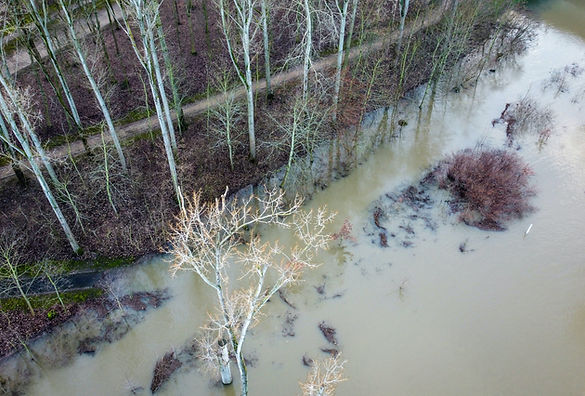

Morrow
Soil and Water
Conservation District

"To educate and assist all people in the conservation of the valuable natural resources of Morrow County."

Morrow SWCD
Drainage Law

"Reasonable Use" Doctrine:
"A possessor of land is not unqualifiedly privileged to deal with surface water as he pleases, nor is he absolutely prohibited from interfering with the natural flow of surface waters to the detriment of others. Each possessor is legally privileged to make a reasonable use of his/her land, even though the flow of surface waters is altered thereby and causes some harm to others. He/she incurs liability only when his/her harmful interference with flow of the surface water is unreasonable.”
The laws are not easily summarized. However, most people who work in the area of drainage or water management would agree to the following:
Ohio Drainage Law
The Morrow Soil and Water Conservation District receives frequent calls from landowners about drainage issues. The Morrow SWCD can provide assistance to landowners who voluntarily wish to improve drainage on their own property, however, will not mediate conflicts between neighboring landowners.
Ohio Drainage Law legally addresses drainage rights and runoff issues:
The "reasonable use" doctrine frequently applied by the Ohio Supreme Court permits broad latitude in the interpretation of individual rights as they pertain to drainage.

· Landowners are entitled to reasonable use of the water that flows across their land as long as it is returned to its natural water course. This includes ponding water behind a dam for personal use or making drainage improvements to protect structures.
· Landowners are generally required to accept the water that flows onto their property in a natural water course, so long as no additional water from another watershed has been added to such flow; subsurface drainage that has been installed for more than 21 years is considered a natural water course.
· Landowners are generally obligated to outlet a natural water course onto their downstream neighbor at the same point the water left the property prior to any development on the site. Changing the flow of water (i.e. volume, direction, or velocity) in a matter that causes damage to an upstream neighbor may result in legal liabilities for damages.
· At this time, the authority to issue orders or resolve conflicts over water rights or drainage problems between neighbors lies with the common pleas court. Serious disputes between landowners are often settled in court on a case by case basis. The exception may be the few cities which have drainage or storm water ordinances.
Water is flowing off of my neighbor's property and creating problems on my property. What can I do?
Since most drainage complaints involve private property, they are managed as a civil matter. No county or township agency, including the Morrow SWCD, has the authority to maintain and/or improve the flow of storm water across private property. In most cases, the landowner must initiate the action to resolve the drainage dispute or make the drainage improvement. To resolve a drainage problem, landowners may:
· Choose to do nothing and accept the consequences (i.e. continued flooding, flood damage).
· Work voluntarily with other landowners involved in the drainage problem, and agree to pay the necessary costs and construct improvements.
· Consult with an attorney to resolve the drainage problem in a court of law where a judge will award damages to address a drainage problem resulting from the negligence of others.
The Morrow SWCD may offer suggestions on how to resolve the drainage issue, but we do not have the authority to tell individual landowners what to do on their property.
Office Location:
5362 US Highway 42
Mt. Gilead, Ohio 43338
Suite 202

Office Hours:
Monday-Friday
8:00a.m. - 4:30 p.m.
Phone:
(419) 946-7923
Additional Resources
The Ohio State University Extension - Bulletin 822
An Overview
"Agricultural producers and landowners in humid areas like Ohio are concerned with the need to dispose of excess water. For agricultural producers, excess water can mean delayed planting, spring flooding and replanting, delayed cultivations, soil compaction and delayed harvesting..."
Law Notes from the OSU Agricultural and Resource Law Program
"Legal conflicts over water are on the rise in Ohio. As a water-rich state, much of Ohio’s water law historically has focused on the right to rid one’s property of water. Drainage issues and lawsuits are frequent. But disputes over the right to own and use water have become more common in recent years, and we are fielding more and more questions about rights to water..."
Law Bulletin: Law you need to know from OSU Extension's Farm Office
"Surface water drainage is undoubtedly important to agricultural landowners. Long ago, Ohio law prohibited landowners from interfering with the natural flow of surface water from property. Over time, our courts recognized that some alterations of surface water drainage were necessary to develop land. But how much change in drainage is too much?.."
Bart Dennison, P.E., P.S., Morrow County Engineer
The Ohio Revised Code establishes the duties of the County Engineer. They include:
-
maintenance and construction of county roadways;
-
maintenance, reconstruction, and inspection of county bridges;
-
engineering advisor to Township Trustees;
-
tax map drafting services; and
-
maintenance of petitioned and assessed county ditches.